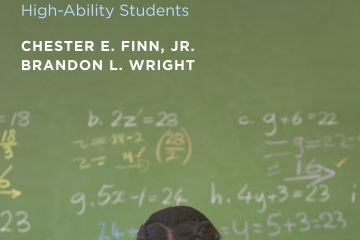No Child Left Behind meant well, but it had a pernicious flaw: It created strong incentives for schools to focus all their energy on helping low-performing students get over a modest “proficiency” bar. Meanwhile, it ignored the educational needs of high achievers, who were likely to pass state reading and math tests regardless of what happened in the classroom. Those most hurt by this approach were high-achieving, low-income students.
The Every Student Succeeds Act offers a powerful opportunity to change that. Fordham’s latest report, High Stakes for High Achievers: State Accountability in the Age of ESSA, examines the extent to which states’ current (or planned) accountability systems attend to the educational needs of high-achieving students; it also explains how states can take advantage of ESSA to create systems that serve all students.
Key findings include:
- Only four states base at least half of their schools’ summative ratings on growth for all students, which should be the primary way that a school's effect on achievement is measured. Seven states and the District of Columbia assign no weight to this measure.
- Only five states treat high-achieving students as a subgroup and separately report their results at the school level.
- Fourteen states and the District of Columbia rate or plan to rate schools’ achievement using a model (such as a performance index) that gives additional credit for students achieving at an “advanced” level. Draft federal regulations appear to make these models illegal under the new law.
- Overall, state accountability systems do very little to encourage schools to pay attention to high-achieving students. Arkansas, Ohio, Oregon, and South Carolina are the only states that can be considered leaders on this issue.
The report offers a number of recommendations to state policy makers, who have the opportunity to dramatically upgrade current accountability systems, as well as one recommendation for the U.S. Department of Education, which is currently in the process of finalizing its ESSA regulations: Allow states to rate academic achievement using a performance index that gives schools additional credit for getting students to an advanced level.
High-achieving students were an afterthought when No Child Left Behind was crafted fifteen years ago. Let’s not make the same mistake again.
Table 1: Results for States without Summative School Ratings
(Click on any of the following state names to view its profile.)
 |
Ohio |
 |
South Carolina |
 |
Illinois, Kansas, New Jersey, Tennessee |
 |
California, Maryland, Montana, New York, North Dakota |
Table 2: Results for States with Summative School Ratings
Click here to download a presentation of the report's findings!












